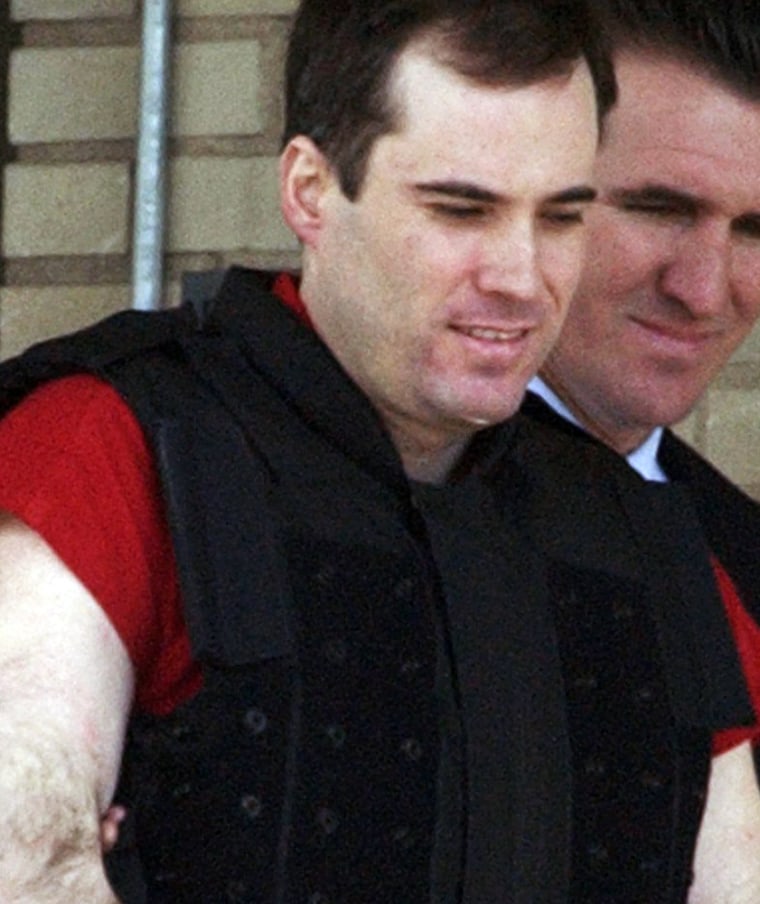Eric Rudolph, who was behind a string of spectacular bombings in the South, including the Atlanta Olympics in 1996, pleaded guilty Wednesday to planting and setting all of them. He admitted in federal court that he was responsible for three bomb attacks in Atlanta — at the Olympics, an abortion clinic and a gay nightclub — and for the 1988 bombing of an abortion clinic in Birmingham, Ala. Now there are new details about the case that federal agents spent years building against the fugitive bomber.
Federal investigators believe that on Jan. 29, 1998, Eric Rudolph stood behind a tree in Birmingham, held a model airplane radio controller as he watched Officer Robert Sanderson step to a certain spot at a nearby women's clinic where abortions were performed and then used the remote to set off a powerful hidden bomb. Sanderson was killed.
A few seconds later, a college student at the University of Alabama in Birmingham noticed that while people were running toward the bombing scene, one man was walking away who later took off and threw away a wig. The student got his license number. That led to a pickup truck and a name — Eric Robert Rudolph. From there, the federal Bureau of Alcohol, Tobacco and Firearms, the FBI and state authorities began carefully building their case.
"I think the government's case was an overwhelming case," says former ATF official Jack Killorin. "And I think by his actions today, Eric Rudolph indicated that he agrees with that."
Among the strong points — the wig. A similar one was found in Rudolph's trailer. So were traces of dynamite all over the inside, even on the bed sheet.
Metal plates used in Rudolph's three Atlanta bombings matched the composition of steel plates made from a single plant and sold by a company in North Carolina, where a friend of Rudolph's worked.

Agents also found a peculiar kind of masonry nail in a storage locker Rudolph rented. Investigators focused on tool marks left by the manufacturer on those nails. They matched marks on nails made from the same production run that were found in the bombs planted January 16, 1997, at an Atlanta abortion clinic.
Another key — the gunpowder used in the Olympic bombing. A dealer remembered selling it to Rudolph and later said it was Rudolph's voice on a 911 emergency call placed just before that bomb went off.
Agents also discovered that Rudolph bought two hose clamps from a Wal-Mart in Murphy, N.C. Pieces of an identical kind of clamp were found in the body of Officer Sanderson in Birmingham.
"His objective from the beginning was mass murder, and his tools were vicious bombs," says the ATF agent-in-charge of the case, Jim Cavanaugh.
Why did Rudolph do it? Investigators believe his main target was the government.
April 19, 1993, was the day of the deadly federal siege at Waco, Texas. That very date — 4-19-93 — shows up in the "Army of God" letters Rudolph wrote. U.S. postal inspectors say the stamps used to send those letters went on sale the same day as the conflagration at Waco, indicating Rudolph may have begun his planning then.
A further sign of government hatred: Rudolph hid a fully functioning bomb across the street from the North Carolina building that housed the investigators looking for him. Agents found and detonated it late last week.
In a written statement released Wednesday, Rudolph said he bombed the Olympics to "embarass the Washington government in the eyes of the world" for sanctioning abortion.
Rudolph will be sentenced in July. He'll serve a life sentence, in a prison run by the government he hated.
